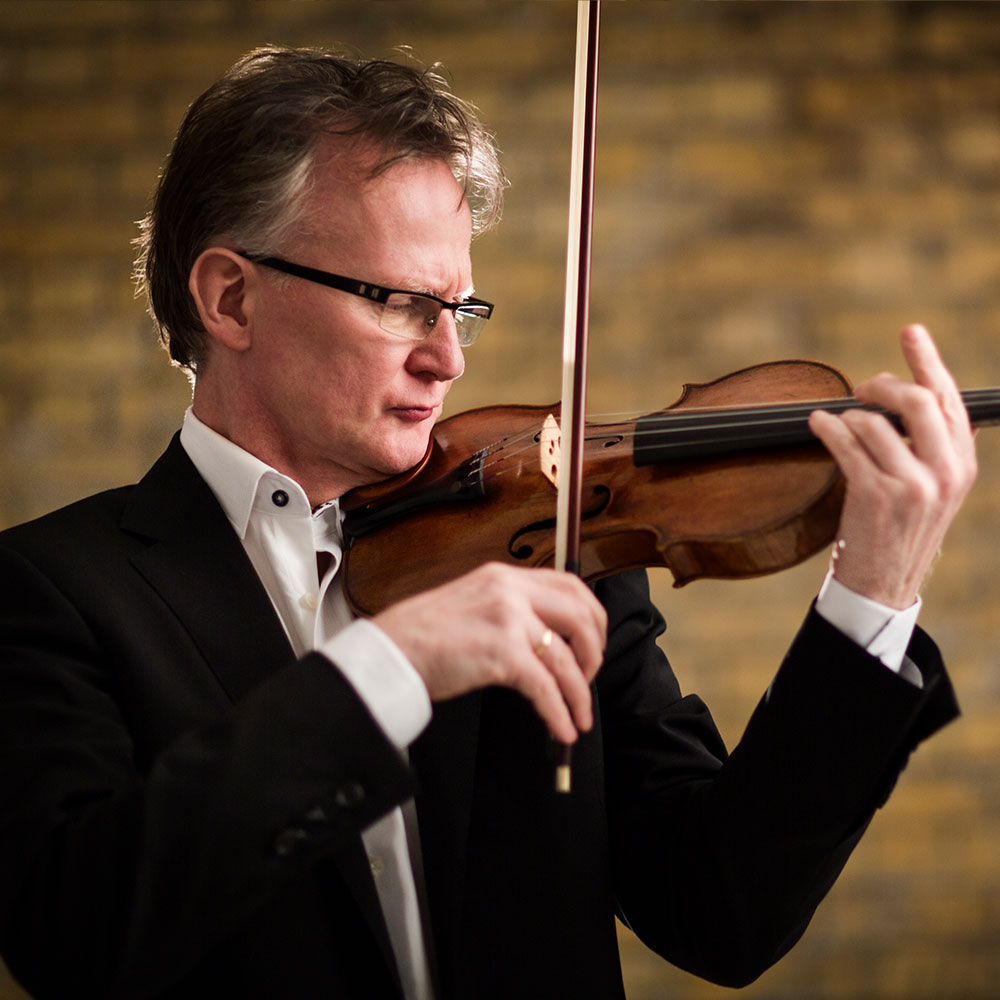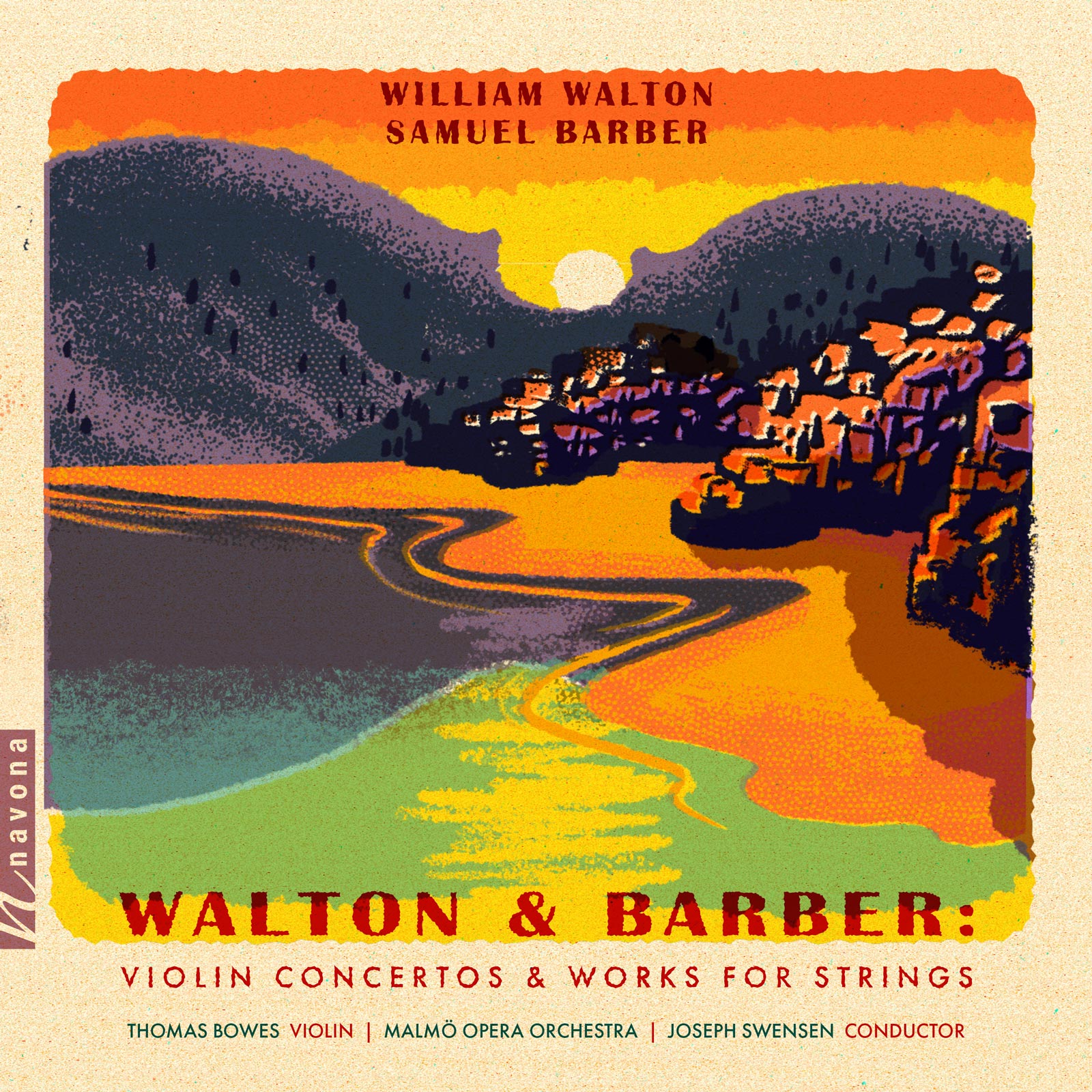
Violinist Thomas Bowes’ breathtaking virtuosity is on full display throughout WALTON & BARBER. His playing, which has been characterized by Gramophone Magazine as “deeply human” and “unusually communicative,” teases out subtleties and rises to the challenge of the most technically-demanding passages. With the violin at centerstage, WALTON & BARBER brings the full power of the orchestra to bear.
Today, Thomas is our featured artist in “The Inside Story,” a blog series exploring the inner workings and personalities of our composers and performers. Read on for a look at the many defining moments along his artistic journey, from the day he gave up cricket to pursue music, to his first performance and beyond…
Tell us about your first performance.
It is July 1977 and I am trying to get myself ready to play my first serious concert. I’m 17. I’m nervous as hell. A sickly feeling is welling up in my stomach and I’m wondering what on earth possessed me to think that this is what I want to be doing with my life. I’m sitting just off-stage with cold yet sweaty hands and can hear that unmistakable murmuring of an audience building up beyond the curtain. The local hall is filling up with people who will listen with perhaps mild interest to a boy who has left school a year ago to pursue his dream. They, those apparently benign well-meaning middle-class types, are probably more interested to see if this teenager can show a few signs of obtaining proficiency enough on the instrument to make a living from it. At least they don’t expect a wunderkind. They’ll be hoping it won’t be too embarrassing or that the little wooden box he’ll scrape will not sound like some recently castrated animal.
But there is just a flicker of hope for me. With a self-imposed schedule of practice, I have over some nine months been able to get somewhere with this most difficult instrument to master: the violin. And I am going to play a solo violin work by J.S. Bach — proper grown up, adult music. Just maybe I can convey a tiny bit of this music’s depth and greatness. But real violinists are born are they not? They emerge at 7 or 8 fully formed, amazing teachers and parents and then unsuspecting audiences; they conquer the world by melting hearts and astounding ears with that peculiarly beguiling sound a violin — played well — can make. Can I get near to any of that?
I know very well that I am not one of these anointed ones. But I love music. And I want desperately to have an ability to match something I’m hearing in my head — where the music sounds so beautiful and powerful. Where I know it can change the world; move and comfort, excite and amaze.
So I do a little praying. I ask that my fingers will go where they are supposed to go, that my bow arm won’t judder and jolt and that the sound I produce from my violin will be acceptable — and of course that I’ll remember the notes. But I also ask to be guided by that inner sound and that I might not, despite the stress of the occasion, lose touch with that glorious sound and sense of the music that exists inside me — somewhere between my heart and head. A place that doesn’t really seem to be anywhere.
The curtain is lifted, and I hear the voice of my teacher as if from another world say, “okay, on you go…good luck.”
Looking back I think I did just well enough to keep going and to get the endorsements one needs at those early stages.
If you weren’t a musician, what would you be doing?
Don’t laugh but I wanted quite badly to be a cricketer. The game fascinates me still and I spend as much time as I can watching and following the game. It is maddening and alarmingly time consuming — matches can take all of five days to come to a conclusion. As I write this, a brilliant series between those oldest of enemies England and Australia is coming to a head in London. I shall be relieved when it’s over and I can continue my life with the more normal things to worry about. But then I will miss it too….
As a schoolboy of 16 I think I showed some promise as a fast bowler. But cricket is a dangerous game for anyone needing to protect and use their fingers! I gave it up at precisely the time that I became very serious about playing the violin and a career in music but have always wondered what might have happened had I found a real mentor for my cricketing skills. Could I really have enjoyed an international career hurling down cricket balls at batsmen? Well it’s always easy to fill in with fantasy when one is offered a void, so I’ll indulgently hold onto that particular dream! Of course, careers in sport are notoriously short lived and any success I might have had would be well and truly over by now so I can’t be too sad about it.
If you could collaborate with anyone, who would it be?
One of the composers long dead whose music I particularly adore. I’d have to choose carefully. It would have to be someone with whom I wasn’t so star-struck as to be rendered completely useless and tongue tied. So I’d avoid J.S. Bach and with great reluctance Paganini — in fact, most of the big composers. Bartok would be particularly scary, I think. That leaves me with someone as enigmatic as Elgar.
But because perhaps I’d share just a little of his self-made background, I reckon he might just find me presentable, and we could have a fine old time talking about this and that. Perhaps I could get out of him if he was just having us all on with his famous Enigma and tell me a few of his other secrets.
What advice would you give to your younger self if given the chance?
Give up the cricket a bit sooner and get down to serious work on the violin a few years earlier!
What’s the greatest performance you’ve ever seen, and what made it special?
I’d have to say two evenings at London’s Royal Opera House. One was seeing Harrison Birtwistle’s The Minotaur. A wave of sustained and visceral terror, excitement and much else besides. I’ve never forgotten the lights coming up at the end of Act One and looking at people’s faces around me. We must all have looked as if we’d been emptied out of some other dimension.
The other was to see my wonderful wife’s opera there based on an Isabel Allende story about love and the confusing ways it messes with us humans. So deeply touching and so full of tenderness.
What musical mentor had the greatest impact on your artistic journey? Is there any wisdom they’ve imparted onto you that still resonates today?
My dear old teacher Bela Katona was the perfect mentor for me as a slow and late starter. He made me realise that anything could yet be achieved — with large amounts of hard work and great patience; and that great happiness lies in the perception of making progress. I hope that he would be proud of me now that I’ve kept working on and growing my playing for all these years. He was not a man to gush compliments but when I recorded the Walton and Barber concertos, I did get a phone call from him telling me that he had listened and was overjoyed to hear what I’d done. That meant the world to me. I felt I’d arrived.

Thomas Bowes is one of the United Kingdom’s finest violinists. He is very active in the realm of cinema, and millions have heard him on the soundtracks of his 200+ film credits. Most recently he was featured as the solo violinist in Alexandre Desplat’s score for Guillermo del Toro’s award-winning stop-motion film Pinocchio.

